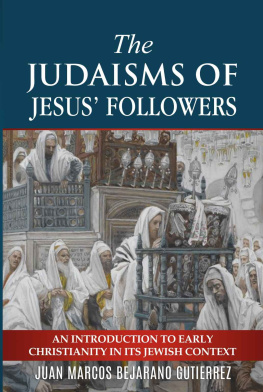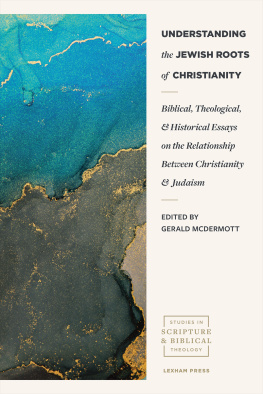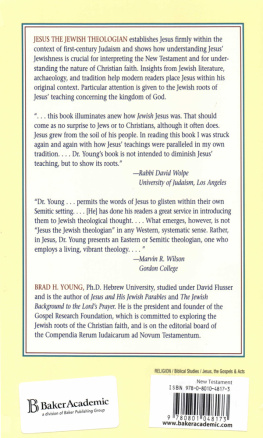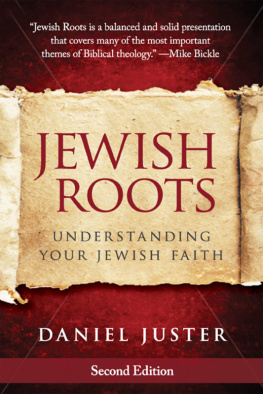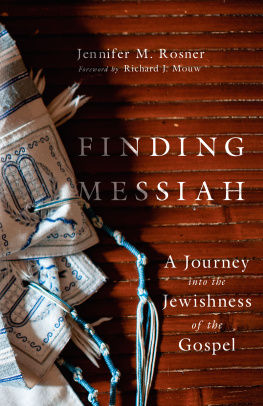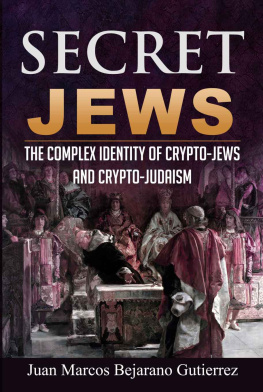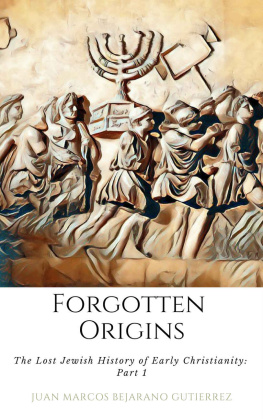The Judaisms of Jesus Followers
an introduction to early Christianity in its jewish context
Juan Marcos Bejarano Gutierrez
Yaron Publishing
GRAND PRAIRIE, TEXAS
Copyright 2018 by Juan Marcos Bejarano Gutierrez.
All rights reserved. No part of this publication may be reproduced, distributed or transmitted in any form or by any means, including photocopying, recording, or other electronic or mechanical methods, without the prior written permission of the publisher, except in the case of brief quotations embodied in critical reviews and certain other noncommercial uses permitted by copyright law. For permission requests, write to the publisher, addressed Attention: Permissions Coordinator, at the address below.
Juan Marcos Bejarano Gutierrez /Yaron Publishing
701 Forest Park Place
Grand Prairie, Texas/75052
www.CryptoJewishEducation.com
Book Layout 2017 BookDesignTemplates.com
Ordering Information:
Quantity sales. Special discounts are available on quantity purchases by corporations, associations, and others. For details, contact the Special Sales Department at the address above.
Book Title/ Juan Marcos Bejarano Gutierrez. 1st ed.
ISBN 9781719941150
Contents
To Eliel and Yaron
For a more expansive review of this topic checkout the following link.

Surely there were disputes concerning this matter in our synagogues and study houses, and sometimes even in the Temple courts. But these were disputes which took place among ourselves; just as there were divisions of opinion concerning other religious matters; but all of us belonged to the sacred congregation of God.
Sholem Asch The Nazarene
Preface
Twenty years ago I sat in a small bookstore with a friend. Her ten-year-old daughter has just finished classes at a local Jewish day school and was sitting close by at another table. Her head was buried in her textbook, and she was busy working on her homework. Her mother and I were discussing an article that had appeared in a local newspaper. The article discussed Judaism and Christianity and some controversy that had arisen over purported missionizing. We kept our voices down to let her daughter study and to avoid some of the controversies we felt might be confusing to her. Suddenly, the little girl lifted her head and looked at us intently and said, Are you guys talking about Jesus? My friend and I looked at each other surprised. Whats the big deal? the little girl said, He is just a Jew like everybody else. As soon as she finished her announcement, she lowered her head and continued to work on her homework as if nothing had happened. My friend looked at me and raised one eyebrow.
I remember that occasion well and think about it often. A ten-year-old girl had made a statement that while not expressed in the eloquent terms of theologians or philosophers expressed a profound truth, or did it? For most Christians, the idea that Jesus was just a Jew like any other Jew is problematic. Jesus is regarded as the son of God. He is God incarnate; the Word made flesh. While he may have been a Jew physically, for many Christians an emphasis on his physical identity misses the point of who he is. The human nature of Jesus is in many ways irrelevant as it seemed to be to the Apostle Paul.
Conversely, for most Jews, the idea that Jesus is just a Jew like every other Jew is just as unconvincing. Jesus is the focal point of a religious tradition which has been at the forefront of anti-Semitism for centuries. Christians may take issue with this statement, but the study of history proves a link exists. While Jesus may have been born a Jew, he or his followers parted ways with Judaism long ago and very little can be said that can erase the memory of persecution. For most Jews, Jesus was a false messiah, a deceiver. He cannot be just a Jew.
Are these the only options when considering Jesus as a Jew? Is it possible for Christians to reconsider how the Jewishness of Jesus is indispensable to the message attributed to him? Can the Jewishness and the Judaism of Jesus provide Christians with an appreciation and understanding of Jesus which reconsiders their connection to Judaism and the Jewish people?
Conversely, can Jews approach the subject of Jesus in a manner that reconsiders fundamental Christian doctrines and beliefs in a manner which does not merely dismiss them as idolatry? Can Jesus be understood independently of the violence perpetrated by his followers? Can the Judaism of Jesus early followers be recognized? In particular, can those Jews who continued to worship in the Temple and flocked to Jesus brother James be seen as authentic Jews?
This book explores the controversial question of the Jewishness of Jesus with a challenge to Christians and Jews to reconsider the most influential Jew of history. For better or worse, the Jewishness of Jesus has affected Jews and Christians for two millennia. The path to this reconsideration is indirect , however. Perhaps ironically, this book does not focus on Jesus but rather the Jews who endorsed his messianic claims and continued to uphold Jewish identity in some form as wholly consistent with this idea in the first centuries of the Common Era.
For a complete analysis of this topic, please consult Forgotten Origins: The Lost Jewish History of Jesus and Early Christianity which contains full references and quotations. Forgotten Origins is a much lengthier work delving into various topics including the messianic expectations of the period.
chapter 1
The Complexity of the Early Jesus Movement
T he Jewish sect which ascribed Jesus the title of Messiah was eventually transformed into a non-Jewish movement wholly separated from its Jewish context. The transformation was not instantaneous, and there were deviating or at the least parallel streams of Jesus supporters early on. A critical mistake which has been made, in my opinion, is the assumption that the Jesus movement was uniform even among its early Jewish followers. Analyzing the original movement(s) in the first centuries of the Common Era can reveal how the schism between Judaism and Christianity evolved. These original Jewish groups are the focus of the following chapters.
Having said this, we should start with affirming a basic premise. The first followers of Jesus were Jews, and the early stages of what we now refer to as the Christian movement in the first century reflected varieties within the world of the Second Temple. Everyone but the most ardent anti-Semites are willing to accede to the Jewish identity of the earliest Jesus supporters. I understand that using the term Christian is problematic for many. There are admittedly many connotations that surround this term. We are to some extent a prisoner of our language, for better or for worse. I will do my best to use terms that emphasize what I believe to be the undeniable Jewish character of Jesus Jewish supporters.
The diversity of the early Jesus movement is partly attested to by Acts 15, which notes the existence of Pharisees among the followers of Jesus. This should be somewhat surprising since the Pharisees often appear as the opponents of Jesus in the Gospels. The makeup of the early followers of Jesus is therefore much more complicated than most people assume.
The Book of Acts also states that some cohanim , i.e., priests joined the ranks of Jesus followers.
The involvement of Essenes in early Christianity has also been suggested, and the teachings and practices of this group closely resemble Christian thought in various areas. Sections of I Corinthians, Ephesians, Acts, Matthew, John, Hebrews, and early Christian writing the Didache, i.e., the Teaching of the Twelve Apostles, may reflect Essene influence or ideas. Anyone familiar with classical Judaism, i.e., the Judaism of the Bible and the Talmud, can appreciate many Jewish elements in the New Testament. There are, however, many points that can strike one as uncomfortable, and unfamiliar.
Next page
